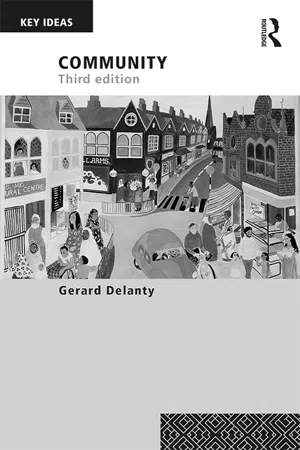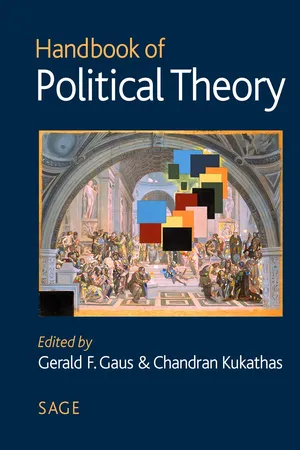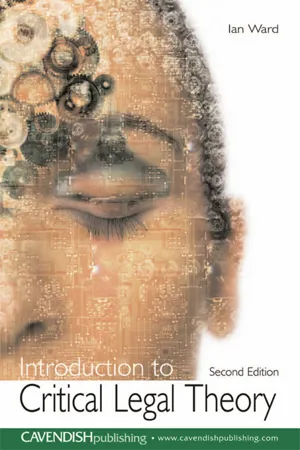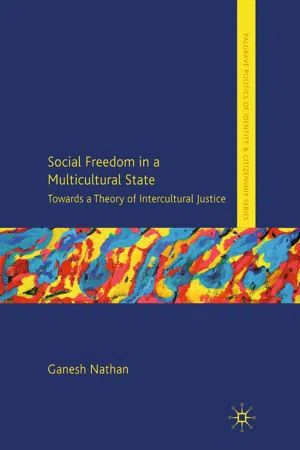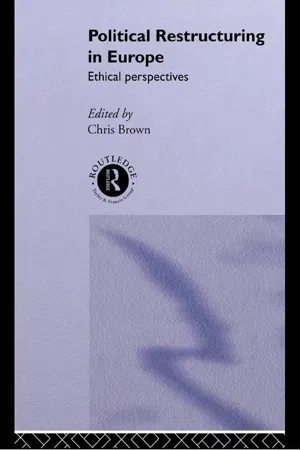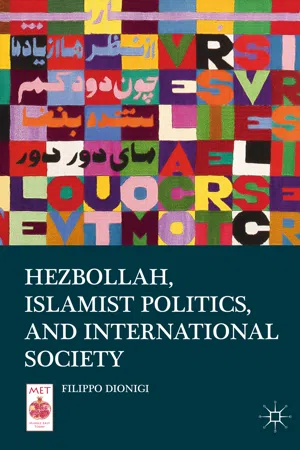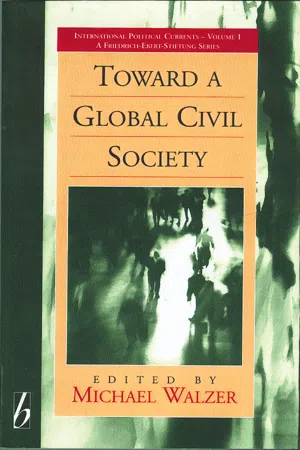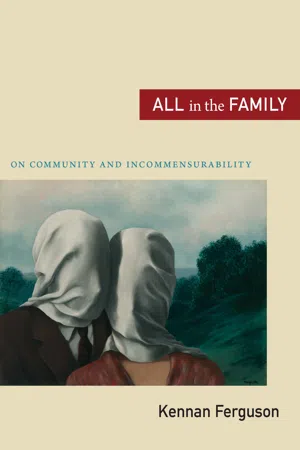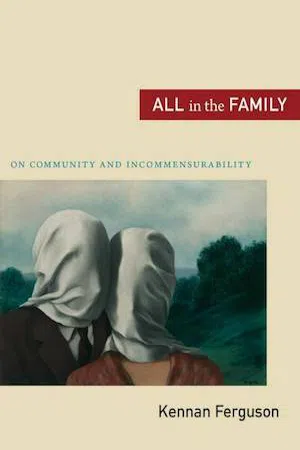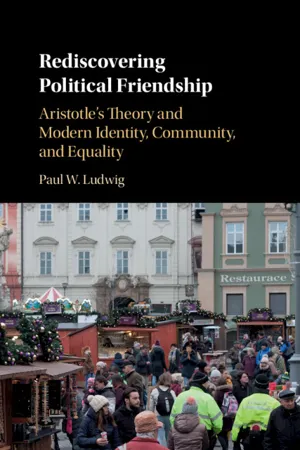Politics & International Relations
Communitarianism
Communitarianism is a political and social philosophy that emphasizes the importance of community and shared values in shaping society. It advocates for a balance between individual rights and the common good, promoting civic engagement and responsibility. Communitarianism seeks to address social issues through collaborative efforts and the cultivation of strong, interconnected communities.
Written by Perlego with AI-assistance
Related key terms
1 of 5
12 Key excerpts on "Communitarianism"
- eBook - PDF
The Struggle Over Borders
Cosmopolitanism and Communitarianism
- Pieter de Wilde, Ruud Koopmans, Wolfgang Merkel, Oliver Strijbis, Michael Zürn(Authors)
- 2019(Publication Date)
- Cambridge University Press(Publisher)
The political ideol- ogy of Communitarianism, by contrast, is defined by the combination of a position that views justice as tied to specific communities and a belief in the nation state as the primary unit in which such circumscribed justice can be realized. As political ideologies, cosmopolitanism and Communitarianism are tools in an ongoing political struggle. They can be used to rally a group around a common cause and to provide a movement with the means to present a coherent agenda on a range of issues, thus, for example, transforming a short-lived single-issue movement into a stable and multifaceted force in politics (Hamilton 1987). We expect cosmopoli- tanism and Communitarianism as political ideologies to rise in the age of globalization, because citizens develop initially unstructured prefer- ences in the face of new opportunities and threats that provide a potential for political entrepreneurs to capitalize on if they can articulate a political ideology and provide political programmes that harness such preferences. However, our conceptualization also allows for two mixed posi- tions. As we have seen, those defending open borders may see serious limitations to just and efficient supranational governance and may find that the implementation of universal justice requires the institutional strength, social cohesion and opportunities for democratic participa- tion that, they argue, only the nation state can offer. At best, some intergovernmental institutions may be used to embed national policies. This position we label as ‘liberal nationalism’. Table 1.1 Political ideologies in the age of globalization Position regarding borders Level of authority Openness Closure Supranational level Cosmopolitanism Regionalism State level Liberal nationalism Communitarianism Cosmopolitanism and Communitarianism 15 At the same time, not all who emphasize the importance of closure focus necessarily on national borders. - The communitarian turn may be summed up in the phrase ‘from contract to community’. 1 Communitarians argue that citizenship is based on a social concept of the individual as a member of a community. Community, in this Communitarianism sense, means the civic community of the polity as opposed to a small-scale traditional community. In the most influential versions of Communitarianism, this civic conception of community has become the basis of a cultural politics of recognition, as in the writings of Charles Taylor. In some interpretations, where there is a stronger emphasis on pluralism, it is often defined in terms of the claims of recognition of a minority group. In the work of Robert Putnam community is linked to a theory of social capital. With Communitarianism, community has become a highly-contested term, and even within communitarian thought there are several strands. In many books and discussions on community the term is never defined, and consequently it is not easy to say exactly who are the representatives of ‘Communitarianism’. In the following analysis I distinguish four main versions of Communitarianism. The first kind is liberal Communitarianism, as associated with the political philosophy of Michael Sandel and Michael Walzer, with a later strand in the work of Charles Taylor. It also includes new concerns with the cultural rights of national communities. 2 The second kind of Communitarianism is what I call ‘radical pluralism’, which is characterized by an emphasis on group rights as opposed to the liberal patriotism of the former. Marion Iris Young and a number of feminist theorists can be associated with this version. The third kind is civic republicanism, or civic Communitarianism, as represented by such figures as Robert Bellah, Philip Selznick, Robert Putnam and David Miller. In their works the emphasis is more on participation in civil society and social capital than on purely cultural conceptions of community
- eBook - PDF
Political Concepts
A Reader and Guide
- Iain MacKenzie(Author)
- 2005(Publication Date)
- Edinburgh University Press(Publisher)
Certainly the political community may be important but it is 439 Political Identities asking a lot for us to have to regard it as paramount over other meaningful associations in our lives. This tension between different levels of community pervades the com-munitarian literature. When politicians argue for the values of community, they can be talking about wildly varying types of association. This tension has been evident in much contemporary writing on community, not least in the work of the most notable ‘political communitarian’ in popular debate, Amitai Etzioni. The growth of political Communitarianism Just as the liberal–communitarian debate appeared to be waning with the emergence of theories of deliberative democracy and multiculturalism, the advancement of community within the realm of politics became more no-table. In part this was a response to the aggressive individualism of the Thatcher/Reagan years, but it was also due to the development of commu-nitarianism as a political movement. Much of the credit or responsibility for this advancement of community must be attributed to Etzioni, who has published widely on communitarian politics in recent years (for a rep-resentative sample see Etzioni 1993, 1995, 1997, 2000, 2001). This can be regarded as a backlash against the hegemony of individualism and an attempt to reassert a new moral politics to underpin the rootedness of in-dividuals within communal groups. In this guise the communitarian credo highlighted the importance of bonds of community to the re-establishment of a strong moral fabric for wider society. However, in recent years it has also been evident that political Communitarianism has become intrinsically bound up with ‘Third Way’ politics and discourses of community and re-moralisation are commonplace in the utterances of politicians such as Tony Blair (Hughes and Little 1999; Little 2002b). - eBook - PDF
- Gerald F Gaus, Chandran Kukathas, Gerald F Gaus, Chandran Kukathas(Authors)
- 2004(Publication Date)
- SAGE Publications Ltd(Publisher)
To others, however, it seems that ‘the communitarian political move-ment, avoiding controversial political issues in order to appeal to as wide a range of constituents as possible, ends up as little more than a moral appeal to us all to behave better: take more responsibility for our social environment, avoid corruption, etc., etc.’ (Miller, 2000c: 109). Communitarianism of this sort may be useful as exhortation, but it is too vague and accommodating to succeed as a political philosophy. REPUBLICANISM REVIVED Whether ‘philosophical’ or ‘political’, communitar-ianism is too vague to be helpful and too accom-modating to be acceptable. Communities take a great many forms, including some – such as fascist or Nazi communes – that communitarians them-selves must find unpalatable or intolerable. Sandel acknowledges the point when he says, in his review of Rawls’s Political Liberalism , that the ‘term “Communitarianism” is misleading … insofar as it implies that rights should rest on the values or preferences that prevail in any given community at any given time’ (1994: 1767). He has, accordingly, abandoned this misleading term in favour of ‘republicanism’. He persists in his criticism of lib-eralism, to be sure, but he apparently believes that he is in a better position to criticize as a republican committed to ‘a formative politics … that cultivates in citizens the qualities of character self-government requires’ (1996: 6) than as a communitarian com-mitted to the prevailing values and preferences in a given community at a given time. What counts for the republican is not community per se , but the com-munity of self-governing, public-spirited citizens. Sandel’s profession of republicanism has con-tributed to a revival of republican political theory that has been under way since at least 1975, when Pocock’s Machiavellian Moment called attention to the ‘Atlantic republican tradition’. - eBook - ePub
- Ian Ward(Author)
- 2012(Publication Date)
- Routledge-Cavendish(Publisher)
The specific invocation of Jeffersonian ideas of democracy has been most recently expressed in Gary Hart's Restoration of the Republic. According to Hart: In the current age, Jefferson's democratic republican ideal might yield a new political culture or a polity founded upon humanity's essentially social nature; a new destiny founded on participation in community life; the restoration of a public ethic that supercedes the private, commercial self; and the elevation of the common good and of commonwealth institutions, such as public schools as instruments of civic education, community welfare as a political and moral function of the ward, and local security provided by the citizen-soldier (Hart, 2002, p 23). Such a Communitarianism, Hart impresses, would encourage, even demand, ‘qualitative’ personal engagement in promoting the ‘common good’ (Hart, 2002, p 61). The wistful tone finds a still clearer expression in Alisdair MacIntyre's suggestion that there is a ‘grave disorder’ in western moral and political philosophy. The late 20th century is characterised by the ‘dissolution of historically founded certitudes’, and it is the individualism championed by a utilitarian liberalism which Communitarianism attacks. MacIntyre admits that there are no moral absolutes, but invokes Aristotle's idea of community to suggest that a community can establish a political, as opposed to universal or natural, ethics. Communitarianism must be refounded securely on such a conception, and present a bulwark against the kind of moral nihilism represented by more radical critical legal scholars (MacIntyre, 1985, pp 2–7, 62–74, 113–17; 1988, p 362). The essential concept in a renewed communitarian politics is justice, because it is justice which underpins the idea of ‘virtue’. The two are codeterminative, for to be virtuous is to be just in all dealings with fellow citizens - eBook - PDF
Social Freedom in a Multicultural State
Towards a Theory of Intercultural Justice
- G. Nathan(Author)
- 2010(Publication Date)
- Palgrave Macmillan(Publisher)
Part III 205 8 Liberalism and Communitarianism In Part II of this book I developed the set of normative criteria for the politics of multicultural integration. Part III examines whether the criteria can assist us in the difficult normative decision-making in dis- criminating among competing political approaches to multiculturalism and diversity in a principled manner. 1 To this end, Part III primarily considers the challenges and limitations of the competing political theories of liberalism, Communitarianism and ‘modern’ or ‘neo-’ civic republicanism 2 as these three ideologies have been discussed most prominently with regard to citizenship theory in recent decades (van Gunsteren 1998: 16–17). I have argued that the ethical situation rather than a particular ethical conviction is important and that multicultural social justice must be concerned with individuals’ capability to function as citizens of equal status. I have also argued that the preconditions of non-domination and social recognition along the three dimensions of specificity, acknowledgement and endorsement that are rooted in self- respect must be met for multicultural social justice to prevail. I shall evaluate these political theories against the set of normative criteria in terms of the five conditions specified in the conclusion of Part II. Political liberalism claims to be an advanced theory that deals with diversity. At the core of liberalism lies the idea of the ‘autonomous individual’, and based on this notion Kymlicka (2001, 2007) promotes liberal multiculturalism. Communitarianism disputes the concept of an autonomous individual and argues that people are ‘embedded in partic- ular social roles and relationships’ (Kymlicka 2001: 19); it is claimed to be conducive to the protection of communities. Republicanism attaches importance to the interdependency of citizens and the political con- struction of community, and claims to support citizens as equal status participants. - eBook - ePub
Political Restructuring in Europe
Ethical Perspectives
- Chris Brown(Author)
- 2003(Publication Date)
- Routledge(Publisher)
The inclusive and non-persepectival character of cosmopolitanism pretty clearly rules out the first mode of influence of communitarian values. On a cosmopolitan view, normative reasoning is incomplete if it fails to take account of the interests of everyone affected; and it is distorted if it privileges proximity in space or time for its own sake. However, the second mode of influence, in which communitarian values are treated simply as one set of inputs to the process of moral reasoning, is entirely consistent with a cosmopolitan approach to ethics. In fact, if membership in a flourishing community of a certain kind is a value for people, cosmopolitanism requires us to bring it into account.Doing so in judgments about the importance of sovereignty may not be easy. First, there is the practical, though hardly insignificant, problem that communal values do not argue for sovereignty in the abstract, but for statehood for certain kinds of groups. Our world may be composed of sovereign states, but one would be badly misled if one regarded most of them, literally, as ‘national states’, or as embodiments of coherent political communities. Some states embrace multiple communities and some include parts of communities that are divided among several states. Because political boundaries do not always follow communal boundaries, a legitimate concern for the integrity of communities will not always translate into sympathy for existing political divisions of the world, which means that communitarian concerns may come into conflict with other values that incline people to defend a state-based conception of world order. In other words, Communitarianism in international politics need not be a conservative position. The decomposition of what was Yugoslavia, now well advanced, illustrates this all too sharply.Even if there were no such practical problems about the communitarian account of the value of sovereignty, there would be the following difficulty of principle. A morally plausible Communitarianism must always hedge its endorsement of sovereignty. What follows for politics from recognizing that communal attachments can be important for people is that certain kinds of groups may be entitled to political arrangements in which they can regard themselves as substantially self-governing. A more precise formulation of this idea would need to be hedged because any group’s entitlement to statehood must, on a cosmopolitan view, be conditional. I turn to the conditions in a moment. For the present, we should simply observe that there is a structural reason why this should be so: since a cosmopolitan view strives to be inclusive, it will never be sufficient to consider only the desires and identifications of a limited group of people. The circumstances of everyone affected must be taken into account. We would be justified in recognizing an entitlement to statehood for a communal group only if doing so was not only best from the point of view of the group but also best overall. As we shall see, this significantly qualifies the responsiveness of cosmopolitanism to communitarian values. - Filippo Dionigi(Author)
- 2014(Publication Date)
- Palgrave Macmillan(Publisher)
In liberal theory the person achieves freedom and personal realization primarily as a result of a process of emancipation in which the exercise of individual autonomy is the decisive factor limiting the influence of heteronomous principles. Both Islamism and Communitarianism purport a different picture. According to these theories the person achieves full liberation and realization (and in the religious context, their salvation) adhering to the ethical principles on which the community is based and not emancipating from it. As Buchanan has noted with reference to communitarian theory:If I am a member of a community I share goals and values with other members. I and they conceive of these as our goals, not just as goals which we each have as individuals and that happen to be the same for all of us. [ . . . ]In activities that are the life of a community, individuals think of themselves primarily as members of the group, and of their values as the values of the group.38According to Communitarianism the boundary between individual and communitarian identity is permeable and individual autonomy does not represent a limit to the adoption of communitarian principles within the ethical principles of the individual. As Taylor has stated, even presuming the existence of a liberal self, independent from the network of social relations in which one is embedded and provided with rights,the identity of the autonomous, self-determining individual requires a social matrix, one for instance which through a series of practices recognizes the rights to autonomous decision and which calls for the individual having a voice in deliberation about public action.39As seen, Sandel is equally critical of the possibility of conceiving persons as moral agents dissociated from the context in which they are educated, raised, and where they establish their social relations.40- eBook - PDF
- Michael Walzer(Author)
- 1995(Publication Date)
- Berghahn Books(Publisher)
The communitarian perspective is also more sensitive to the values of tradition, to the funded experience of the community, and to the continuities of conventional and critical morality. Not long before I made my break with Marxism-Leninism, I engaged in a debate with Irving Howe. I argued for the proposition that Marxism should no longer be taught as the official doctrine of the organization to which we belonged. What I was suggesting in that rather quixotic effort was another alternative, a different way 128 • Philip Selznick of thinking, one more congenial to the American spirit and the American intellectual experience. I had in mind the philosophy of John Dewey. There are signs today of a rekindled appreciation for what was once considered a crowning achievement in American thought. Dewey was a great spokesman for communitarian liberalism. He combined a spirit of liberation and social reconstruction with a strong commitment to responsible participation in effective com-munities. In his view, communities are effective insofar as they encourage uncoerced communication and insofar as they can apply intelligence and experimentation to problems of collective life. An important aspect of Dewey’s thought is the connection he drew between democracy and community. He had a conception of communal democracy—which is not his term but the way his ideas have been characterized by various writers Let me outline four principles of communal democracy. These may help to clarify the meaning of Communitarianism. Communal democracy looks to the sovereignty of the people as a whole. There-fore it requires the protection and integration of minorities. And this means that it is profoundly anti-majoritarian. Although major-ity rule is one way of expressing the will of the people, it is not the only way, nor is it a self-sufficient way. Majorities may represent the community, but they are not the community. - eBook - PDF
All in the Family
On Community and Incommensurability
- Kennan Ferguson(Author)
- 2012(Publication Date)
- Duke University Press Books(Publisher)
COMMUNITIES AGAINST POLITICS 39 Michael J. Sandel, though a more subtle and meticulous theorist than Wilson or Etzioni, shares with them this particular desire for permanence. For Sandel, community is openly dependent on universally shared mean-ings, especially on political issues such as justice. Even when he critiques the universalization of sovereignty (namely, across different communi-ties), Sandel posits smoothly operating communities as the alternative sub-sovereignties which become magically comprehensive. For example, he promotes Catalan, Kurdish, and Québécois communities as alterna-tives to statehood for those peoples — not suggesting sovereignty per se, but instead merely the ability to create standardized communities under the aegis of the state — as if such goals are desirable to either the insurrec-tionary populace or the governing nations. 12 He envisions communities (ideally) as safeguards from the vagaries and threats of modernity and capital; but to serve such a purpose, all members of these communities must be united in their efforts and protective of their collective identity. This is not to say that Communitarianism does not come in a wide array of forms, as anyone attentive to the state of political theory at the end of the last century is well aware; indeed, the above examples should indicate its variety. Communitarians may, as in the case of Wilson, attempt to form a statewide civil and criminal regulatory apparatus, or may, as in the case of Jean Bethke Elshtain, want to protect the essences of imperiled com-munities from the standardization of mass culture. 13 But what each has in common is a desire to reinforce the standards of a community, to encour-age its resistance to the kinds of people or ideas that threaten it, be those the demands of “black nationalists,” “drug kingpins,” or “international capitalism.” The discrete and independent community, whatever its size, is their temple, and their motto is ne vile fano . - Kennan Ferguson(Author)
- 2012(Publication Date)
- Duke University Press(Publisher)
11 Indeed, in Wilson’s eyes, those movements that challenge this cultural identity in the United States actively threaten the very constitu- tion of the country. COMMUNITIES AGAINST POLITICS 39 Michael J. Sandel, though a more subtle and meticulous theorist than Wilson or Etzioni, shares with them this particular desire for permanence. For Sandel, community is openly dependent on universally shared mean- ings, especially on political issues such as justice. Even when he critiques the universalization of sovereignty (namely, across diferent communi- ties), Sandel posits smoothly operating communities as the alternative sub-sovereignties which become magically comprehensive. For example, he promotes Catalan, Kurdish, and Québécois communities as alterna- tives to statehood for those peoples — not suggesting sovereignty per se, but instead merely the ability to create standardized communities under the aegis of the state — as if such goals are desirable to either the insurrec- tionary populace or the governing nations. 12 He envisions communities (ideally) as safeguards from the vagaries and threats of modernity and capital; but to serve such a purpose, all members of these communities must be united in their eforts and protective of their collective identity. This is not to say that Communitarianism does not come in a wide array of forms, as anyone atentive to the state of political theory at the end of the last century is well aware; indeed, the above examples should indicate its variety. Communitarians may, as in the case of Wilson, atempt to form a statewide civil and criminal regulatory apparatus, or may, as in the case of Jean Bethke Elshtain, want to protect the essences of imperiled com- munities from the standardization of mass culture.- eBook - PDF
Rediscovering Political Friendship
Aristotle's Theory and Modern Identity, Community, and Equality
- Paul W. Ludwig(Author)
- 2020(Publication Date)
- Cambridge University Press(Publisher)
PART III A Different Way to View Liberalism 5 From Communitarianism to Civic Friendship Broadening Out beyond Associations Up until now, the best contenders for a modern theory of civic friendship have been found in communitarian thought. Yet communitarians lack a realistic model for society-wide friendship. There is no convincing way to scale up from the small associations that operate more like families to the overall society which, in liberalism, is very large (the “extended sphere”) and very diverse. 1 Proclamations such as “friendship is prior to justice,” important though these may be for understanding how small associations feel, can never provide an adequate basis for society-wide friendship. Communitarians miss an important point, namely that civic friendship, like other utility friendships, is only a friendship “by analogy.” Communitarians fail to follow the analogies of friendship. For Aristotle, honor becomes the civic form of love, and money becomes a marker for it. Only such an analogical approach could ever hope to extend friendship throughout an entire polity. Furthermore, the theoretical underpinnings of communitarian thought lack any meaningful assurance that “community” could never take on a dark or rigid form. Though thinkers like Michael Sandel may decry the “capture” of community by illiberal voices, 2 they provide no adequate safeguards to prevent it. Communitarian theory requires, at the least, an important revision. Com- munitarian theory bases itself mainly on narrative. By contrast, civic friend- ship assumes a spare theory of human nature. Nature is a major stumbling block for many contemporary theorists because they suspect it can be used as a “foundation.” But only a grounding in human nature, I argue, can safeguard rights of individuals in the parochial communities that make up the patchwork of the larger society.
Index pages curate the most relevant extracts from our library of academic textbooks. They’ve been created using an in-house natural language model (NLM), each adding context and meaning to key research topics.

